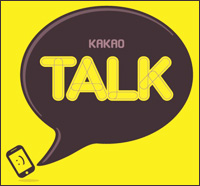
LG Uplus embraces Kakao Talk
 LG Uplus, Korea’s smallest mobile carrier, announced Thursday that it will allow its users’ total access to Kakao Talk’s free Internet call services without any limitation or additional fees. The decision is likely to pressure SK Telecom and KT, who are currently restricting users from the service.
LG Uplus, Korea’s smallest mobile carrier, announced Thursday that it will allow its users’ total access to Kakao Talk’s free Internet call services without any limitation or additional fees. The decision is likely to pressure SK Telecom and KT, who are currently restricting users from the service.
Tension rose between the three companies and Kakao Talk, following the revelation Monday that the messenger service provider had started testing its mobile voice over Internet protocol service (VoIP). It seemed the three would rally against Kakao Talk, until LG changed its mind.
“We withdrew our limitation of access (to Kakao Talks’ VoIP) today. We had an emergency meeting early in the morning and discussed issues that came up concerning the new service such as call quality and payment, but decided to forego them,” said LG Uplus public relation division’s Sam Lee during a press conference. “This is not a temporary thing, and we will allow total access to all our users from now on.”
“Unlike other firms, who are blocking their subscribers’ access to Kakao Talk’s new service, LG Uplus, as a leader in the LTE market, believes that we should take a different stance for the benefit of the users.” Lee stressed that the “open network policy” only applied for VoIP, and said the matter was seperate from network neutrality.
LG Uplus initially stated early Thursday that it planned to block its customers access to Kakao Talk’s new service and was considering additional fees to allow restricted use.
Within hours, the firm reversed its decision and announced that they will allow total access to the new service and require no fees. Following the announcement, 5 million LG “2.5 generation” and long-term evolution (LTE) users are now able to use the VoIP service without any additional requirements.
Users of the new service can call each other toll free via the platform, which will likely decrease the revenue of other telecommunications companies.
Market research firm Atlas Research & Consulting predicted Wednesday a loss of 1.8 trillion won annually, which is 8 percent of the three firms combined revenue for last year.
The service started overseas in February but was delayed here due to strong opposition by mobile carriers. Kakao Talk has over 47 million subscribers, almost equal to Korea’s population.
Daum’s mobile messenger service My People was the first to launch a VoIP service in the domestic arena in February last year, and mobile carriers reacted by blocking access and requiring additional fees from subscribers. They were less concerned as My People’s user base at the time was just 4 million.
LG Uplus’ two domestic competitors expressed their displeasure over the announcement. SK Telecom and KT currently receive fees for restricted access to Internet services offering free calls such as Skype and My People, and had previously said that they would do the same with Kakao Talk.
“Voice calls account for 80 percent of our annual revenue of 12 to 13 trillion won. If VoIP officially launches, there is no doubt that our losses will be huge,” said an SK Telecom official, who declined to be named, and said the company was set on maintaining its stance. “It is only logical to require additional fees from our subscribers and limit access to Kakao Talk’s VoIP.”
SK Telecom, the nation’s top wireless service provider, was the hardest to slam the VoIP, releasing a statement opposing the service only hours after the revelation it was available here Monday.
The official expressed his doubts about the quality of the new VoIP service: “We’ve tried it out ourselves but found the quality to be very poor with two seconds reaction times on average. It also barely works on subways and buses, which reminded us of Daum’s My People, which gained lesser popularity than expectations when launched.”
On LG Uplus’ stance, the official said that its rival could afford to take such an open position as they have less to lose than SK Telecom and KT. LG Uplus made no investment in 3G technology while the other two firms invested billion of won to build the required network.
“In the view of LG Uplus, they have nothing to lose. To use mobile VoIP, you need smartphones and they have the least amount of distribution since they had no hand in 3G. I can’t say we are pleased with the announcement.”
LG Uplus’ Lee admitted that part of its decision on VoIP was because of its small user base, and was not subtle in hoping more users will be drawn towards its LTE platform following the change in policy. LG Uplus has 2.4 million users for its LTE services, while market analysts predict that the total number of LTE users will be 10 million within the year.
“We plan to continue our policy on mobile VoIP.” said KT’s public relation manager Kim Yoon-jeong. “Our basic stance is that we do not approve (of mobile VoIP), but may allow limited access for a monthly fee depending on the user’s subscription and data use.”
Kakao Talk has repeatedly insisted through various statements that limiting access or requiring fees for users for VoIP by the mobile carriers was against network neutrality. <Korea Times/Cho Mu-hyun>


